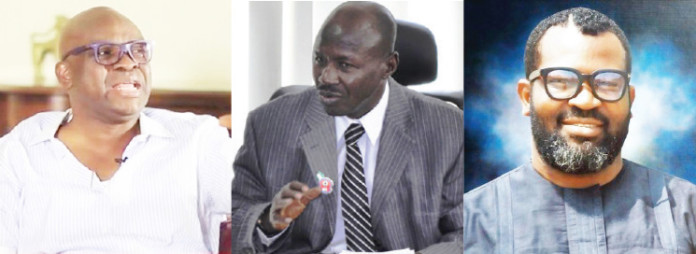The recent face-off between the Economic and Financial Crimes Commission (EFCC) and Ekiti State Governor, Ayodele Fayose, on the freezing of the latter’s account has continued to generate controversy on the immunity clause, writes Assistant Politics Editor, DANIEL KANU.
The nation may yet witness another round of intense legal combat on the interpretation of the immunity clause enshrined in the constitution, as lawyers are divided on the issue.
Certain officials of government, particularly the executive arm, enjoy immunity from prosecution while they are in office. This, as enshrined in the constitution, is to keep them some poles from distraction and allow them perform optimally.
This legal battle is consequent upon the freezing, on Monday, June 20, of the personal Zenith Bank account of Governor Ayodele Fayose of Ekiti State by the Economic and Financial Crimes Commission (EFCC).
Fayose is of the Peoples Democratic Party (PDP). During the Ekiti governorship election in 2014, he upstaged Kayode Fayemi, then governor under the All Progressives Congress (APC), to become governor.
Fayose raised the alarm following his inability to access the account. When he visited the bank personally, ostensibly to make withdrawal, he discovered an embargo placed on the account without notice. This he described as illegal and criminal.
Fayose’s angst, according to him, is that the EFCC acted in flagrant disregard of the fact that he enjoys immunity.
Said Fayose: “I found out that the EFCC blocked my account and the accounts of some of my associates. I see this as illegal. If you want to fight corruption, fight corruption based on rule of law.
“I’m a sitting governor and under Section 308 of the 1999 Constitution, I enjoy immunity.
“You must do anything you want within the ambit of law. This government has no respect for constitutional provisions. They should not be in a hurry; in 2018, I will be done. I will come to them myself. I have become a figure in this country that I have nowhere to go.
“This rascality of EFCC must stop. Did they (referring to APC candidates who he accuses to be masterminds of his ordeal) not contest election? Where did they get the funds from? Is it because they are the sitting government (at the centre)? We will take every legal step to get things right; they can’t continue with this rascality.”
It is already in the public domain that Fayose had been having a running battle with the EFCC over the funding of his governorship campaign in 2014. There had been speculations that the campaign was funded from the office of the former National Security Adviser (NSA), Dasuki Sambo, who is in detention while being tried for misappropriating money meant for the purchase of arms to fight terrorists.
But Fayose had denied the allegation, saying his campaign funds were generated from the ordinary people who wanted him in power.
The outspoken governor had, before this incident, accused the President Muhammadu Buhari administration of running a “selective anti-corruption crusade”.
Placing the EFCC claim
Of course, the anti-graft body, after its initial silence, has confirmed freezing the said account. Details provided by the agency said the action “is in order” and that findings would be made public in due course.
EFCC spokesperson, Wilson Uwujaren, disclosed that what the organisation did was not illegal but in accordance with the EFCC Act, just as he clarified that immunity does not shield governors or public officers from investigation.
He went further to caution Fayose to play along with the agency rather than kick, as he could not stop the anti-graft agency from doing its job.
“It is true that we have frozen Governor Fayose’s account in connection with an ongoing investigation. We will soon release the details of our findings to the public.
“We froze the account because Fayose has no immunity against investigation,” Uwujaren disclosed. “Let me clarify that the 1999 Constitution does not grant immunity to governors or public officers against investigation. (But) The governors and others enjoying the immunity clause in Section 308 cannot be prosecuted. Therefore, Fayose cannot stop EFCC from doing its job.”
Understanding the immunity clause
So much has been said about the immunity clause enshrined in Section 308 of the Constitution of the Federal Republic of Nigeria 1999 (as amended).
It reads in part: “(a) no civil or criminal proceedings shall be instituted or continued against a person to whom this section applies during his period of office; (b) a person to whom this section applies shall not be arrested or imprisoned during that period, either in pursuance of the process of any court or otherwise; and (c) no process of any court requiring or compelling the appearance of a person to whom this section applies shall be applied for or issued: no account shall be taken of his period of office.”
Danger ahead
It started as a threat by the senators of PDP, the major opposition political party, that they would withdraw support from the APC-led government of Buhari.
Then the APC flayed the agenda as frivolous, reminding them of their primary responsibility of lawmaking and representation of their constituents. The party, in a statement issued by its national secretary, Mai Mala Buni, also dared the PDP to expose any APC official it believes to be corrupt to the anti-corruption agencies, saying that the administration’s anti-corruption crusade must not be to the dictates of the PDP.
Today, senators of the PDP have made good their threat. They accused the ruling party of undue intimidation and selective justice.
If nothing is done to salvage the situation and change the present perception of the PDP and by extension large members of the public, political observers say it portends bad publicity for the ruling party.
Those who spoke with TheNiche, see the development as a danger signal which the APC must be cautious about, as it may affect the credibility of the party.
Also, it is believed that it may draw the sympathy of most Nigerians who at the moment are uncomfortable with the harsh economic reality under the watch of Buhari.
Lawyers speak
Chris Akiri, solicitor of the Supreme Court of Nigeria, sees the EFCC action as illegal. He is of the opinion that the war against corruption is gradually becoming war against political opponents.
The Chairman, Editorial Board of National Daily Newspaper, said during Channels television interview programme, ‘Sunrise Daily’ on Thursday, June 23, that it’s illegal to freeze a sitting governor’s account, which amounts to punishment.
Said Akiri: “If you didn’t take him to court (and they couldn’t in view of Section 308 of the constitution as amended) and you didn’t take him to the EFCC (and they couldn’t, in view of the same provision) and they went ahead to freeze his account, the EFCC would have erred against the constitution and the doctrine of audi alteram partem (hear the other side) which is covered by Section 36 of the constitution, and any case against him will be upturned.
Lawyer and director-general of the Change Ambassadors of Nigeria (CAN), Prof. Chris Nwaokobia (Jnr.), said EFCC is in order by freezing the account. For him, Fayose enjoys immunity from prosecution, but does not enjoy immunity from investigation.
According to Nwaokobia, freezing the account is not punitive, as it were, rather, try to avoid a situation where, perhaps, the resources received is not transferred to another account.
“I do not understand the hoopla, the noise in the public space concerning the action of the EFCC. I think it is about time Nigerians aggregated to lampoon corruption and call a crime by its name,” he submitted.
Ebun-Olu Adegboruwa, also a legal practitioner, disagrees with Nwaokobia, insisting that the action is illegal.
“For the court to make an order, there must be papers (court process) filed in court and signed by the judge. Section 308(1)(a) says no suit can be instituted against Fayose in any court in Nigeria. So, no process of court can be issued, signed or served, if it bears Fayose’s name, in his personal capacity,” Adegboruwa argued.
“By Sections 26-34 of the EFCC Act, a suspect must have been arrested for his account to be frozen. By Section 308 of the 1999 Constitution, Fayose cannot be arrested and his bank account cannot be frozen. We must encourage EFCC to act according to law, else we go into full-blown dictatorship.”
Last line
Corruption must be fought within the ambit of the law and anything less would be perceived as political victimisation and intimidation by government.
And this, commentators say, would endanger the nation’s young democracy that Aso Rock vowed to deepen.














